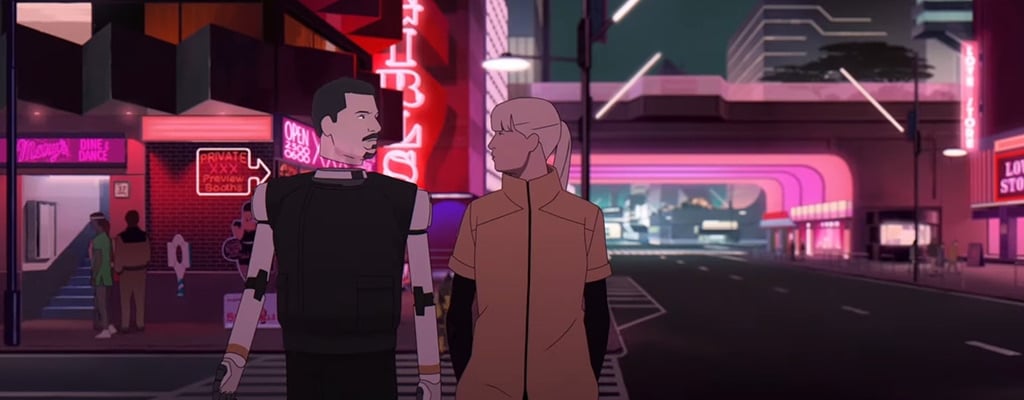A gem of French animation mixing science fiction and film noir, Mars Express can be seen in theaters today. Before embarking on an unforgettable space odyssey, meet your pilot, director Jérémie Périn.
A UFO at the crossroads of genres
On a planet Mars colonized by humanity, detective Aline Ruby, played by Léa Drucker, is looking for a missing young cybernetics student. His progress in this unusual affair leads him into a vicious and sordid spiral whose outcome could upset the fate of the entire galaxy…
Inexplicable disappearances, breathtaking chases, android duels… A hybrid French creation, Mars Express is placed halfway between avant-garde science fiction and a (very) dark film. Presented at the Cannes and Annecy festivals, this animated gem stands out for its position at the crossroads of genres and its original visual style reminiscent of the best graphic novels of anticipation.
From his inspirations to the role of artificial intelligence (AI) in art, director Jérémie Périn spoke about his project at the microphone of AlloCiné. So before embarking on an unforgettable journey to space (and the future), your captain will explain the program to you and reveal all the secrets of Mars Express!
AlloCiné: What was your starting point for imagining Mars Express?
Jérémie Périn: It was a desire, born from a lack, at the time we were writing the film, of more pragmatic science fiction. We are surrounded by SF in the cinematographic landscape, but it is fantastic, even magical SF, where metaphor counts more than science. I like it, but Laurent Sarfati (the co-writer) and I were missing a slightly more credible sci-fi.
We needed a scenario, obviously, a universe too. At that time, the utopias and fantasies of tech billionaires wanting to live in space to escape global warming and future wars were already relevant, which also inspired us.
What role did you have in the choice of performers? What work steps did you put in place to bring to life, together, the characters you had created?
Jérémie Périn: In fact, there really wasn’t one! I like to bring people into animation who are not yet accustomed to working there. There was a desire on the part of the producer, Didier Creste, to have headliners, which didn’t pose a problem for me as long as we found the right headliners. I only needed actors whose voices carry charisma, allowing the characters to be recognized simply by sound.
I found Léa Drucker impressive in Up to the Guard, but she is also gifted in the comedy register. I thought this super broad spectrum was perfect for Aline. Mathieu Amalric had already played the bad guys, so that made me laugh, especially since he’s a great actor with a particular and interesting voice.
It’s a very different kind of acting work, where the body is removed and all attention is on the voice. It’s a different way of approaching work and everything is done very quickly. I spoke with them about the characters on the phone, but the recording was done immediately afterwards. In a voice creation situation like this, we need voices before the animation to allow lip-sync, the synchronized movement of the lips on the labials.
Copyright Gebeka Films
Why did you choose to mix film noir and science fiction? Why do you think these two cinematographic genres go together so well?
Jérémie Périn: Detectives are very present on television, where there are many investigative series. If this marriage works, it is because in a science fiction film as in film noir, it is the search for truth that resonates. Viewers seek to understand the science fiction universe while the characters seek to uncover the truth behind a crime.
We have relied heavily on this kind of interlocking, since the technologies and social relationships of the futuristic world of Mars Express are not explained through dialogue. Spectators must analyze them, decipher them using clues, and therefore wonder about the world they discover while the investigation unfolds.
This futuristic world is filled with details and technology. How did you imagine them?
Jérémie Périn: We met specialists, programmers, planetologists… An automobile designer participated in the film by fully modeling with his teams the vehicle used by Aline and her partner, Carlos (Daniel Njo Lobé). They made realistic 3D versions of it and there was even talk of making a life-size sculpture of it, we were like crazy, even if that never happened!
We surrounded ourselves with people who had better expertise than us and who could give us ideas. If we hadn’t met them, we would undoubtedly have had the reflex to do like in other films, to repeat things we’ve already seen. These discussions nourished us on how to use these objects.

Copyright Gebeka Films
What were your inspirations? There is in Mars Express lots of references to Blade Runner, but also to Japanese animation (Ghost in the Shell, Pluto). Is this a universe that you feel close to?
Jérémie Périn: Of course ! I bathed in it, I still bathe in it even if I have less time. I recently started Pluto, which Mars Express joins on several themes. We have the same references, these are subjects that have been addressed by SF for a long time and which still resonate today.
What is your favorite animated film? Do you think he inspired you for Mars Express?
Jérémie Périn: There are several films that I like to rewatch regularly: Ninja Scroll, Patlabor, Cyber City Oedo 808… These films are the result of an era, so some have aged poorly, but I retain a tenderness for them today. More recently, I was struck by the Tengoku Daimakyo series, whose post-apocalyptic “young adult” register renews the genre.
Akira and Moebius have, indirectly, influenced my work with their realistic but very refined style. This is also the case for all the “children” of this cinematography: Memories, the films of Satoshi Kon… I like these animators and directors who worked on stylized photorealism, this utopian desire to touch reality without ever happen, but which nevertheless leaves an impression of reality.
Animation is sometimes considered a genre aimed at young people. Would you like to defend, with Mars Express, an animated cinema intended primarily for adults?
Jérémie Périn: Completely, that’s the whole intention. More adult French animated films already exist, we can think for example of Persepolis or I lost my body, but I wanted to add to that the specificities of a genre film, here SF. Adult animation is often accepted when it is historical, social or political. This is all very good, but I think the spectrum can be broadened by bringing in adventure, horror or sci-fi, for example.

Copyright Gebeka Films
A large place is given to androids and artificial intelligences in your film. What do you think of their use, particularly in animation? Do you think they are useful, or on the contrary dangerous for artists?
Jérémie Périn: I’m in an in-between place! I think the mistake would be to just be afraid of it. Now that they exist, AIs need to be worked on to see what we can do with them. They can become utilitarian, practical. The idea could be to have an AI disconnected from the Internet, which would not plunder the work of others, but which would be closed and would be fed only by the work of its user to save him time.
But the time saved could be a reason to tighten budgets and creation deadlines, which would pressurize the production teams… It’s a complicated debate!
Mars Express, by Jérémie Périn, can be seen today at the cinema.